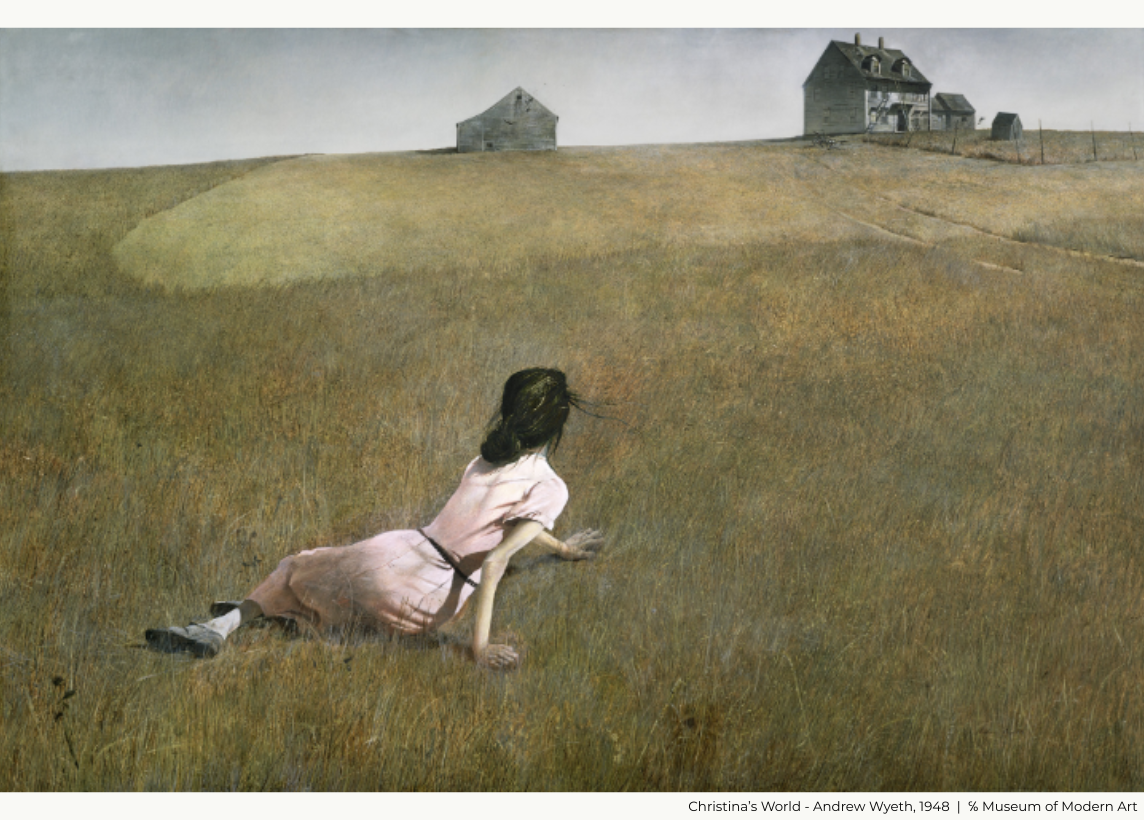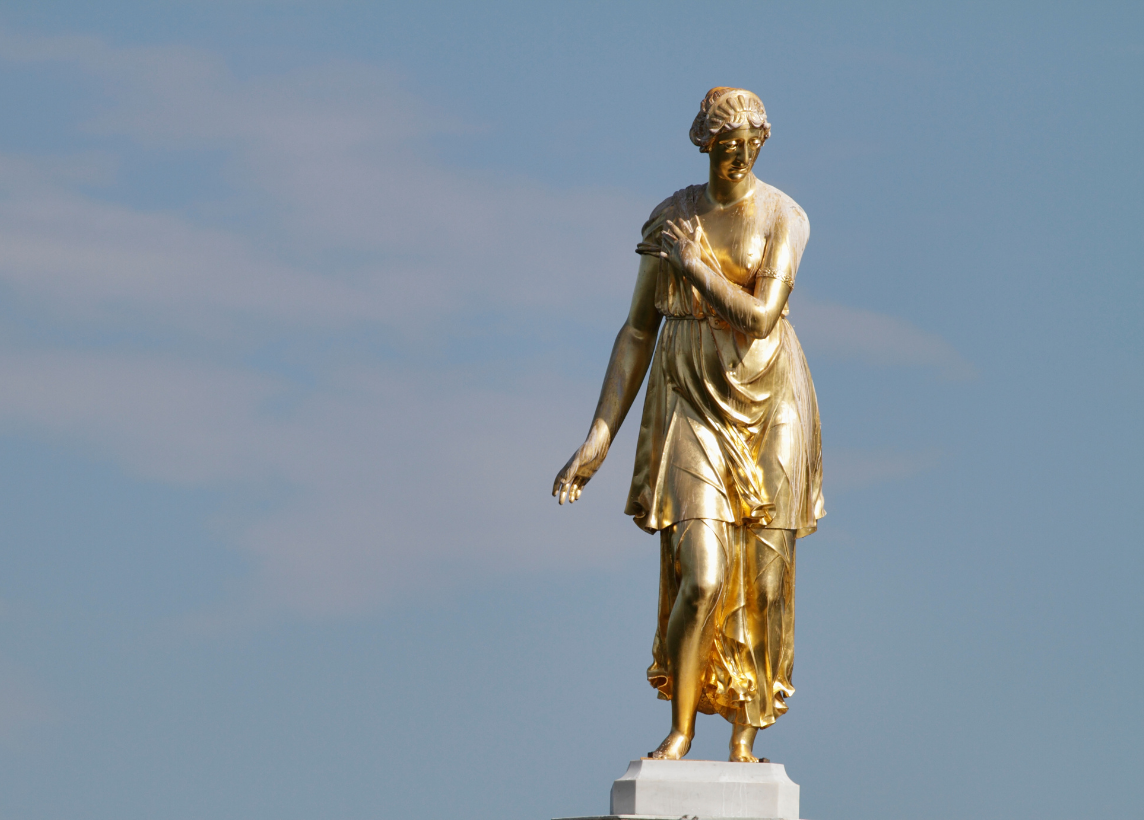
hero
noun (1)
he·ro ˈhir-(ˌ)ō
1 a: a mythological or legendary figure often of divine descent endowed with great strength or ability
b: an illustrious warrior
c: a person admired for achievements and noble qualities
d: one who shows great courage
2 a: the principal character in a literary or dramatic work —used specifically of a principal male character especially when contrasted with heroine
b: the central figure in an event, period, or movement
Achilles was known as the most formidable figures in the Trojan War, his uncontrollable fury making him a fierce warrior that would conquer the battlefield as portrayed in the Iliad. His incredible strength in war granted him a close relationship to the deities, according to Greek mythology, though he was also tragically known for the power of his wrath over the power of his love. Thus, he was known for his bloodthirsty actions over anything else, and yet was still considered a hero.
Hero, a priestess of Aphrodite, is lesser known. She fell in love with Leander, a mortal man, who swam the Hellespont every night to see her. Hero would light a lantern atop her tower to guide his way until one night when a storm extinguished the flame. Leander lost his way and drowned in the river, and Hero threw herself into the water to die with her love upon hearing the news. They are said to have washed ashore in each other’s arms and were buried in eternal rest together as lovers.
So when you hear the word hero, what do you picture? Is it a muscular vision of a man from Greek mythology, his brute strength and hardened judgment ruling over armies and conquering kingdoms with righteous fury? Or do you happen to picture Hero, who bore that very name and gave her life to spend eternity with her love?
Regardless of our interpretations, the words hero and heroine are intentionally gendered for literary purposes, much like the basic depiction of differences between men and women. Those of us who spend time on social media may have had a chuckle at posts poking fun at male interpretations of female rage, depression, and romance: our soft skin is framed by delicate shoulders and flowing hair as we quietly mourn a breakup, our movements fawn-like and deliberate as we exist in private and public, our big beautiful eyes reflecting intense emotion that is turned inward lest we compromise our feminine appearance.
Heroine, much like women, has a softer and more “feminine” meaning behind it. As much as our achievements have been downplayed (or downright erased) in history, our achievements are depicted as a graceful rise to the top and humble acceptance of recognition.
Nevermind that in real life, we face blood, sweat, tears, and discrimination to earn that recognition. Just ask Brenda Berkman, a celebrated heroine of women’s rights and first responder at ground zero after the 9/11 attacks.
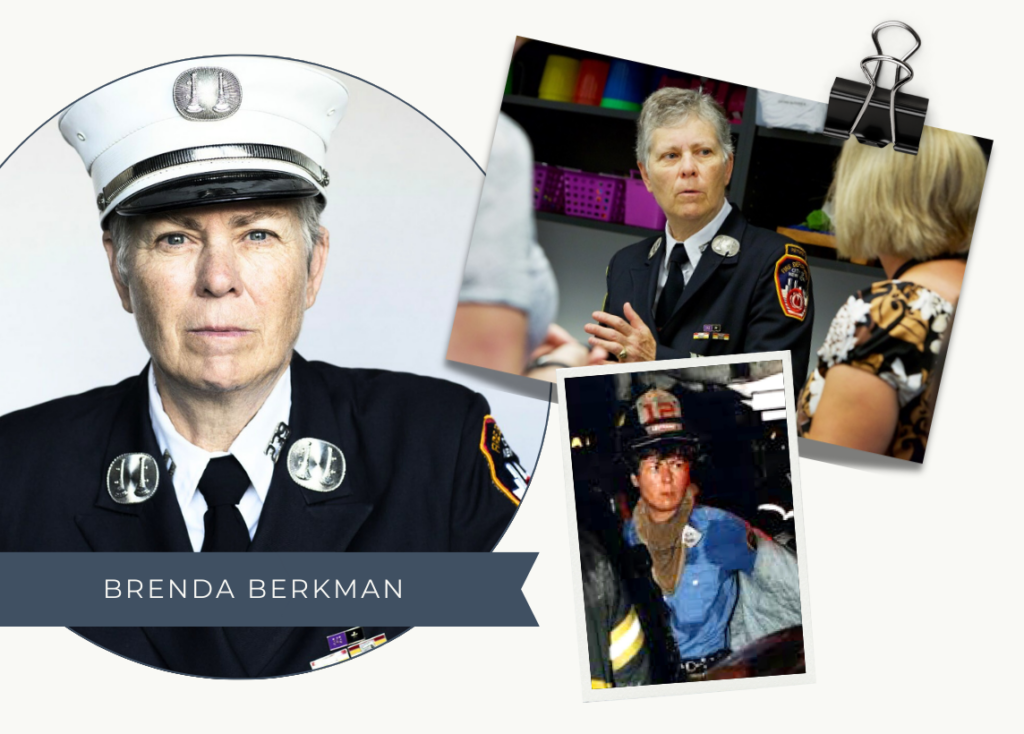
Brenda Berkman had 20 years under her belt as a lieutenant and had the day off when she received a call to turn on her television. Upon seeing the tragedy that struck her city and country, she immediately donned a firefighter suit and headed to ground zero.
They worked as they grieved: Berkman knew 250 of the 343 firefighters killed. She never watched the media coverage of the attacks in the weeks that followed. So she was surprised when she started getting phone calls from other women firefighters she knew across the country.
What is going on in New York? they asked her. There were no women — not just women firefighters, but no women first responders at all — in the coverage of the day, though they knew women, including Berkman, had been there.
That struck Berkman. It was because of her that women were able to join the ranks of the New York City Fire Department in the early 1980s after she sued the department. And here, on what would become one of the most harrowing days in American history, the service of the women firefighters was being erased.
“They were saying, ‘Well, there were no women firefighters killed there, and so, therefore, there weren’t any women there, or the women there were useless because they weren’t killed,’” Berkman said. “It’s like we had to be killed doing our job.”
Three women first responders — Port Authority Police Department Captain Kathy Mazza, New York Police Department Officer Moira Smith and EMT Yamel Merino — were killed at Ground Zero. Dozens of others responded to the scene, including the 25 women firefighters who were part of the department at the time. But the focus of the coverage at the time was on the heroism of the firemen and policemen. Women were only spotlighted as widows or nurses, another example of how women are often erased from history, Berkman said. (Source: WFAE 90.7)
Berkman’s uniform that day bore the name of Vincent Brunton, a Brooklyn captain who had tragically passed earlier that day as he scaled the second tower right before it collapsed. As a result, many thought Berkman herself was missing for some time.
This was a stark reminder of her advocacy work in the late 1970s when she sued the New York City fire department to have the right, as a woman, to apply for a job… and the right, as a woman, to not simply be fired over discrimination of her gender.
In the years since she retired as a captain in 2006, much of Berkman’s work has been consumed by ensuring that women continue to be part of the narrative — the true narrative — of what really happened that day on ground zero. She has traveled across the country speaking to lawmakers, giving speeches and collaborating on a video that highlights the women who served, as well as showcasing her original artwork that captures her personal connection with the events of 9/11. (Source: WFAE 90.7)
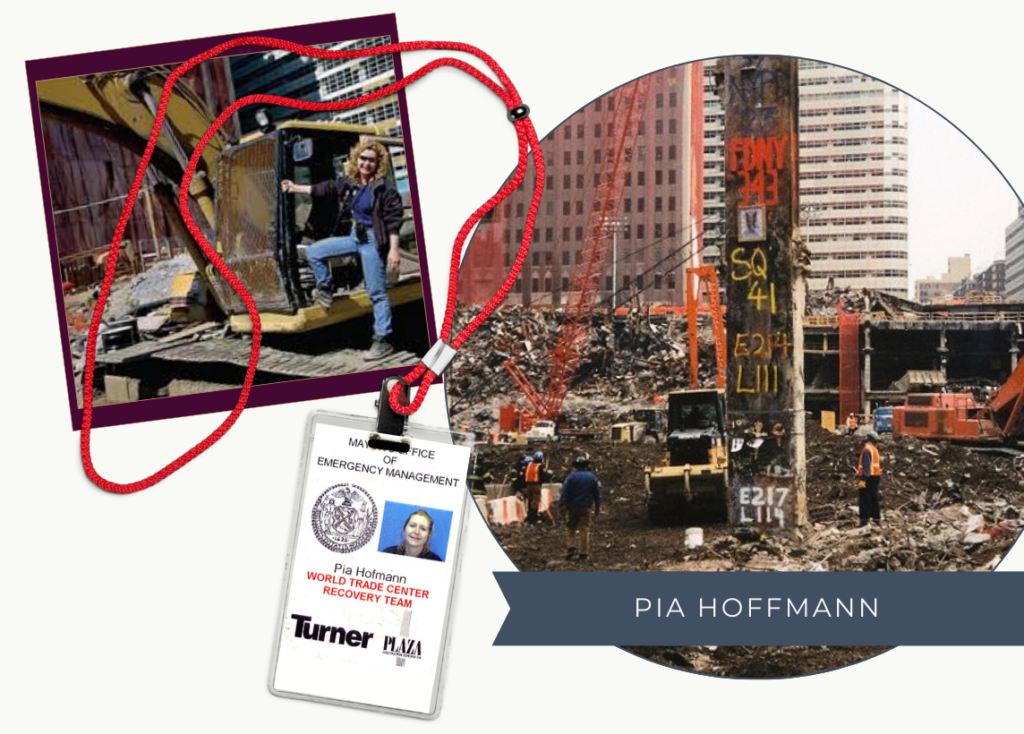
Brenda Berkman’s story is certainly not linear nor unique, nor is that of Pia Hoffmann.
Pia Hoffmann arrived in the United States from Germany ready to embrace the American dream. She spent years designing high-end formal gowns and working as a stay-at-home mom. Divorce led her to pursue construction, a career that would ensure a steady income and health insurance for her family.
It took nearly 5 years for Pia to obtain her license as a crane operator, and even then she was only allowed to operate smaller equipment or fill in when another operator was absent. This was barely a couple of weeks before the terrorist attack,
On September 19th, 2001, Pia Hoffmann was assigned her own rig at ground zero. As she later reflected on that memory, she expressed that she was sure she was in the right place at the right time.
The construction workers were offended by what they had nicknamed the “bag and tag” manner of dealing with civilian corpses: Uniformed bodies were blessed by a cleric and carried out on flag-draped stretchers while civilian bodies were simply zipped into black body bags and trucked off to the morgue.
Hofmann changed all that.
It had been just before lunch on a February afternoon when the crane operator uncovered the body of an office worker. Someone on the ground yelled for a body bag to be hauled in, but Hofmann snapped.
“That body ain’t coming out of there on my watch without a priest blessing it first,” she shouted over the drone of her machine’s engine.
Bobby Gray, who had been appointed ground zero’s master mechanic, a role that made him responsible for overseeing all the operating engineers, was radioed to mediate. When he arrived–leaving his lunch behind at a nearby diner–he found Hofmann calm and reasonable, but firm. The dead deserved respect, she said, whether they carried a badge or not.
In the end, the body was blessed by a priest and an impromptu civilian honor guard was assembled. The practice became standard after that. (Source: Chicago Tribune)
Whether hero or heroine, these women displayed valorous efforts in the face of a national tragedy. Their work is neither feminine nor masculine – it is heroic. It is vital to our country and communities, and an inspiration to women in every field that they are worthy of being called a hero, and historically significant enough to reframe the word heroine.
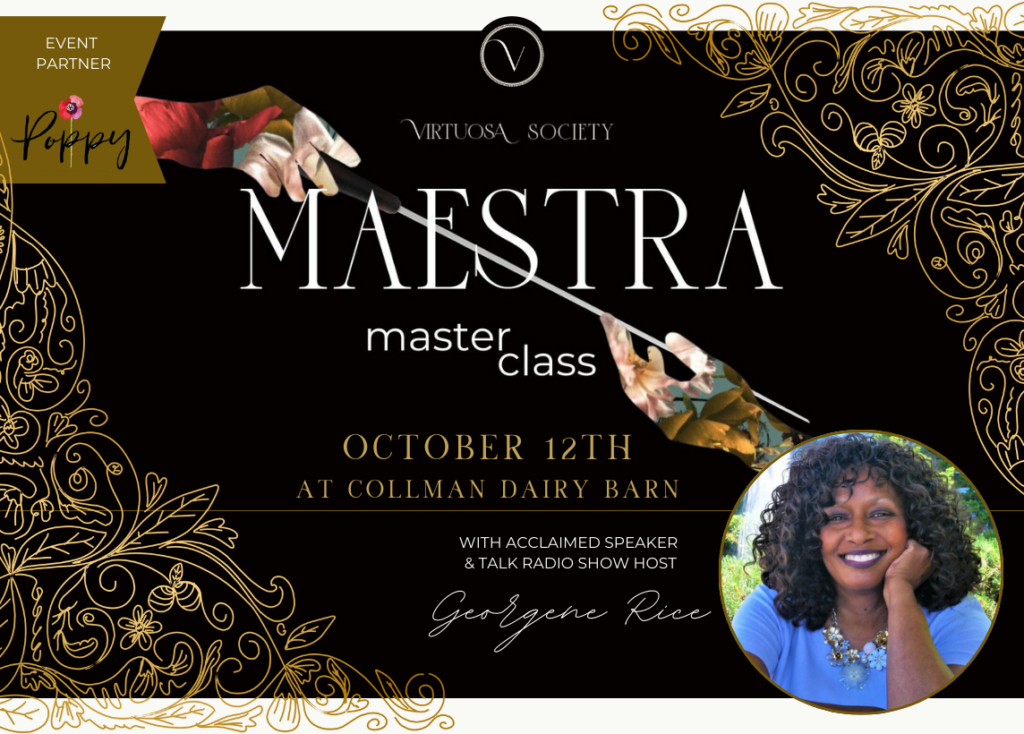
We as women know that femininity and heroines come in all shapes and sizes, and so do their stories.
As we embrace transition into autumn, Virtuosa Society is hosting its annual Maestra Masterclass with acclaimed speaker and talk radio show host, Georgene Rice. Sharing a wealth of wisdom and experience, Georgene will be addressing “The Art of Conversation” in beautifully prepared masterclass sessions, providing practical guidance and invaluable takeaways to apply in all areas of your life.
Join us on Saturday, October 12th at the scenic Collman Dairy Barn in Klamath Falls, Oregon – a private events space operated by dynamic mother-daughter duo Karen & Jordan Wendt – owners of Poppy on Main, our event partner.
Half day retreat from 10am-3:30pm includes:
- Catered lunch by Keegen Mueller, acclaimed head chef and owner of A Leap of Taste
- Bespoke blends of tea by Nana’s Tea Room
- Dessert created just for the event by our affiliate partners CocoGlow & Bonnie Nork’s Treats
- Beautifully curated gift bag, handwoven by female artisans in Australia and filled with goodies to nourish and uplift throughout the season and beyond.
Registration is now open to all!
Click here to reserve your seat.
Proceeds from registration go toward Virtuosa Society’s new Janet Coleman Grant. Named in honor of beloved musician and music director Janet Coleman, the grant will be the first of Virtuosa Society’s new slate of financial awards to female creatives pursuing innovative projects, beginning 2025.
Georgene wants you to know…
“The art and beauty of conversation is miraculous. The fruit of meaningful connection allows unique individuals to experience the joy of relationships. Sadly, we can miss the opportunity to be known and to know others out of fear, self-doubt, or because we underestimate our true value and the value of others. So, how can we avoid awkward self-doubt? How might we see in others their true beauty? We’ll consider the fine art of listening and developing an open heart that makes meaningful connection possible. We’ll explore how to handle and resolve conflict and how to love others well. You are a gifted woman, and the world awaits the sound of your unique and incredible voice. So, join us as we work toward your perfect pitch in the art and beauty of conversation.”
More about Georgene:
Georgene Rice is a radio talk show host in Portland whose career has spanned 35 years and whose goal is to generate light rather than heat. She has traveled internationally as a station correspondent, as a musician, and to serve the poor. She has lectured on university campuses and is a frequent speaker and worship leader at Christian conferences and retreats. Georgene serves on several boards and regularly volunteers for charitable organizations. A musician, Georgene is a featured vocalist in the Portland Singing Christmas Tree and along with her husband Dan has traveled internationally teaching and performing Gospel music. The Rice’s have produced two projects, ‘A Servant’s Prayer’, and ‘Christmas Light’. And in collaboration with longtime friends, partnered in producing ‘Undaunted: the Daring Journey of Faith’. A full-time caregiver for her 93-year-old mother, Georgene loves serving and connecting with others in conversation and through music.
More about Virtuosa Society:
Inspired by a vision to connect contemporary women through elevated conversation, innovative collaboration, and thoughtful support, the Virtuosa Society launched in 2023 as a collective for creative women across various genres and industries. Within a year, we evolved into a nonprofit organization, offering financial grants and assistance for diverse projects.
Virtuosa Society’s mission is to nurture creativity and virtuosity in women through connection, edification, and financial support. We recognize the unique non-linear journey of female creatives and highlight the very specific challenges and opportunities surrounding female creatives. Where women gather, our stories cultivate growth.
We believe collaboration and access to community will help alleviate burnout and shift the perception paradigm surrounding creative life from being highly competitive, male-driven and all-or-nothing.
We also believe that the output of female creatives are imperative for strengthening society. Where women gather, we generate the power to elevate the whole of society and creativity can flourish in abundance.

Sources:
https://en.wikipedia.org/wiki/Hero_and_Leander
https://www.chicagotribune.com/2002/09/02/crane-operator-finds-self-among-trade-centers-lost-2/
+ view the comments

